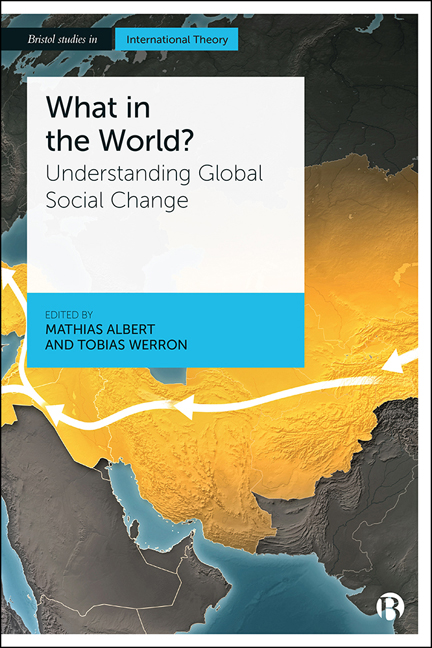Book contents
- Frontmatter
- Contents
- List of Figures and Tables
- Notes on Contributors
- Acknowledgements
- 1 Introduction: World Society and Its Histories – The Sociology and Global History of Global Social Change
- 2 Every Epoch, Time Frame or Date that Is Solid Melts into Air. Does It? The Entanglements of Global History and World Society
- 3 Periodization in Global History: The Productive Power of Comparing
- 4 Communication, Differentiation and the Evolution of World Society
- 5 Field Theory and Global Transformations in the Long Twentieth Century
- 6 Organization(s) of the World
- 7 Particularly Universal Encounters: Ethnographic Explorations into a Laboratory of World Society
- 8 From the First Sino-Roman War (That Never Happened) to Modern International-cum-Imperial Relations: Observing International Politics from an Evolution Theory Perspective
- 9 Nationalism as a Global Institution: A Historical-Sociological View
- 10 States and Markets: A Global Historical Sociology of Capitalist Governance
- 11 The Impact of Communications in Global History
- 12 The ‘Long Twentieth Century’ and the Making of World Trade Law
- 13 Third-Party Actors, Transparency and Global Military Affairs
- 14 Technical Internationalism and Global Social Change: A Critical Look at the Historiography of the United Nations
- References
- Index
9 - Nationalism as a Global Institution: A Historical-Sociological View
Published online by Cambridge University Press: 22 December 2021
- Frontmatter
- Contents
- List of Figures and Tables
- Notes on Contributors
- Acknowledgements
- 1 Introduction: World Society and Its Histories – The Sociology and Global History of Global Social Change
- 2 Every Epoch, Time Frame or Date that Is Solid Melts into Air. Does It? The Entanglements of Global History and World Society
- 3 Periodization in Global History: The Productive Power of Comparing
- 4 Communication, Differentiation and the Evolution of World Society
- 5 Field Theory and Global Transformations in the Long Twentieth Century
- 6 Organization(s) of the World
- 7 Particularly Universal Encounters: Ethnographic Explorations into a Laboratory of World Society
- 8 From the First Sino-Roman War (That Never Happened) to Modern International-cum-Imperial Relations: Observing International Politics from an Evolution Theory Perspective
- 9 Nationalism as a Global Institution: A Historical-Sociological View
- 10 States and Markets: A Global Historical Sociology of Capitalist Governance
- 11 The Impact of Communications in Global History
- 12 The ‘Long Twentieth Century’ and the Making of World Trade Law
- 13 Third-Party Actors, Transparency and Global Military Affairs
- 14 Technical Internationalism and Global Social Change: A Critical Look at the Historiography of the United Nations
- References
- Index
Summary
Introduction
Nationalism just does not seem to want to disappear. On this account alone, it represents a major challenge for theories of global change. As globalization scholars, we constantly set ourselves to discover global connections and global structures where long-standing traditions in our disciplines primarily see national histories, national phenomena or national problems. But while going beyond methodological nationalism is certainly the right thing to do, it can easily distract one from the fact that the history of nationalism, too, is a globalization story: the story of a model of collective identity and state organization that has spread globally and transformed international politics profoundly in the past two centuries (Mann, 1997; Wimmer and Feinstein, 2010). The neglect of this story is one of the reasons for the recurring surprise at the alleged ‘resilience’ or ‘resurgence’ of nationalism in the last roughly 40 years.
At the peak of the enthusiasm for globalization in the mid-1990s and early 2000s, there was a lot of talk about the ‘end of nationalism’ and the ‘end of the nation state’. Back then, in the not so distant past, many globalization theorists assumed that the time had come for a ‘flat world’ and a truly ‘cosmopolitan age’. Nationalism and the nation state were considered too small for the big problems, too big for the small problems and thus bound to be replaced by global or more local forms of identity formation and political organization as a consequence of increasing globalization (see, for example, Friedman, 2005; Ohmae, 1995). By contrast, the last few years have seen a growing discourse about a ‘new nationalism’, which can refer to phenomena as diverse as the nationalist rhetoric and politics of authoritarian governments (for example, China, Russia, Turkey, Hungary), independence movements (for example, in Catalonia and Scotland), the rise of nationalist parties in Europe (for example, the Front Nationale in France and Alternative fur Deutschland (AfD) in Germany), or the increasing popularity of protectionist economic policies (for example with the Trump administration in the US).
Was nationalism dying in the 1990s while it is now ‘new’ and ‘resurgent’? The contrast between these two debates is even more striking considering that it is not the first debate of its kind.
- Type
- Chapter
- Information
- What in the World?Understanding Global Social Change, pp. 157 - 176Publisher: Bristol University PressPrint publication year: 2020



